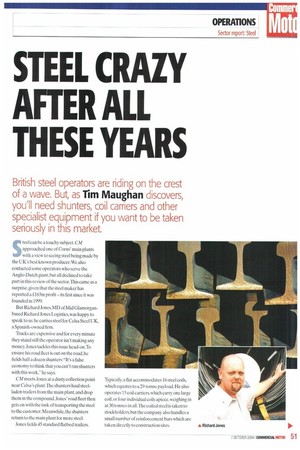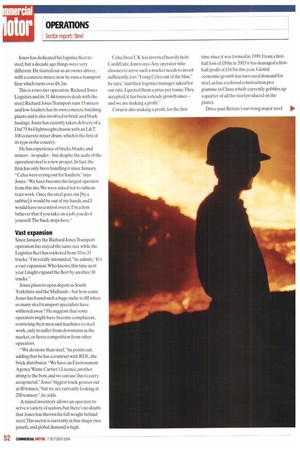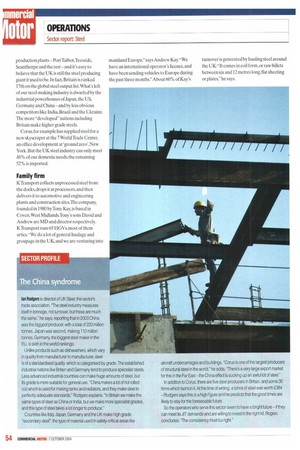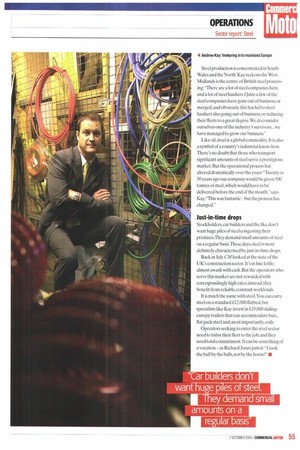STEEL CRAZY AFTER ALL THESE YEARS
Page 51

Page 52

Page 54

Page 55

If you've noticed an error in this article please click here to report it so we can fix it.
British steel operators are riding on the crest of a wave. But, as Tim Maughan discovers, you'll need shunters, coil carriers and other specialist equipment if you want to be taken seriously in this market.
Steel can be a touchy subject. CM approached one of Corus' main plants with a view to seeing steel being made by the UK's best known producer. We also contacted some operators who serve the Anglo-Dutch giant. but all declined to take part in this review of the sector.This came as a surprise, given that the steel maker has reported a £163m profitits first since it was founded in 1999.
But Richard Jones, MD of Mid Glamorganbased Richard Jones Logistics, was happy to speak to us: he carries steel for Celsa Steel UK, a Spanish-owned firm.
'Bucks are expensive and for every minute they stand still the operator isn't making any money. Jones tackles this issue head-on.To ensure his road fleet is out on the road. he fields half a dozen shunters:-It's a false economy to think that you can't run shunters with this work." he says.
CM meets Jones at a dusty collection point near Celsa's plant.The shunters haul steelladen traders from the main plant, and drop them in the compound. Jones' road fleet then gets on with the task of transporting the steel to the customer. Meanwhile, the shunters return to the main plant for more steel.
Jones fields 45 standard flatbed trailers. Typically, a flat accommodates 16 steel coils, which equates to a 29-tonne payload .He also operates 15 coil carriers, which carry one large coil, or four individual coils apiece, weighing in at 30 tonnes in all.The coiled steel is taken to stockholders,but the company also handles a small number of reinforcement bars which are taken directly to construction sites. Jones has dedicated his logistics fleet to steel, but a decade ago things were very different. He started out as an owner-driver, with a concrete mixer; now he runs a transport firm which turns over £6.2m.
This is a two-tier operation. Richard Jones Logistics and its 31 44-tonners deals with the steel; Richard Jones Transport runs 15 mixers and low-loaders,has its own concrete batching plants and is also involved in brick and block haulage. Jones has recently taken delivery of a Daf 75 8x4 lightweight chassis with an L&T 100 concrete mixer drum, which is the first of its type in the country.
He has experience of bricks, blocks, and mixers — in spades—but despite the scale of the operation steel is a new project. In fact,the firm has only been handling it since January. "Celsa were crying out for hauliers," says Jones."We have become the largest operator from this site.We were asked not to subcontract work. Once the steel goes out [by a subbie] it would be out of my hands, and I would have no control over it. I'm a firm believer that if you take on a job. you do it yourself.The buck stops here."
Vast expansion Since January the Richard Jones Transport operation has stayed the same size while the Logistics fleet has rocketed from 10 to 31 trucks. "I'm totally astounded," he admits,"It's a vast expansion. Who knows, this time next year I might expand the fleet by another 30 trucks."
Jones plans to open depots in South Yorkshire and the Midlands — but how come Jones has found such a huge niche to fill when so many steel transport specialists have withered away? He suggests that some operators might have become complacent, restricting their men and machines to steel work, only to suffer from downturns in the market ,or fierce competition from other operators.
"We do more than steel," he points out, adding that he has a contract with RDL, the brick distributor. "We have an Environment Agency Waste Carrier's Licence, another string to the bow, and we can use this to carry scrap metal." Jones' biggest truck grosses out at 80 tonnes,"but we are currently looking at 200 tonners", he adds.
A mixed inventory allows an operator to serve a variety of sectors, but there's no doubt that Jones has thrown his full weight behind steel.This sector is currently in fine shape (see panel), and global demand is high. Celsa Steel UK has invested heavily in its Cardiff site,Jones says.Any operator who chooses to serve such a market needs to invest sufficiently, too."I rang Celsa out of the blue," he says,"and their logistics manager asked for our rate.! quoted them a price per tonne.They accepted, it has been a steady growth since — and we are making a profit."
Carus is also making a profit, for the first time since it was formed in 1999. From a firsthalf loss of f:89m in 2003 it has managed a firsthalf profit of £163m this year. Global economic growth has increased demand for steel, as has a colossal construction programme in China which currently gobbles up a quarter of all the steel produced on the planet.
Drive past Britain's surviving major steel production plants —PortTalbot,Teesside, Scunthorpe and the rest — and it's easy to believe that the UK is still the steel producing giant it used to be. In fact, Britain is ranked 17th on the global steel output list. What's left of our steel-making industry is dwarfed by the industrial powerhouses ofJapan. the US, Germany and China — and by less obvious competitors like India, Brazil and the Ukraine. The more "developed" nations including Britain make higher grade steels.
Cortis. for example has supplied steel for a new skyscraper at the 7 WorldTrade Center, an office development at 'ground zero', New York. But the UK steel industry can only meet 48% of our domestic needs; the remaining 52% is imported.
Family firm
KTransport collects unprocessed steel from the docks, drops it at processors, and then delivers it to automotive and engineering plants and construction sites.The company, founded in 1980 byTony Kay, is based in Coven, West Midlands.Tony's sons David and Andrew are MD and director respectively. K Transport runs 65 HGVs.most of them artics." We do a lot of general haulage and groupage in the UK, and we are venturing into mainland Europe." says Andrew Kay. "We have an international operator's licence, and have been sending vehicles to Europe during the past three months." About 60% of Kay's turnover is generated by hauling steel around the UK: "It comes in coil form, or raw billets between six and 12 metres long, flat sheeting or plates," he says. Steel production is concentrated in South Wales and the North. Kay reckons the West Midlands is the centre of British steel processing:"There are a lot of steel companies here, and a lot of steel hauliers. Quite a few of the steel companies have gone out of business, or merged, and obviously this has led to steel hauliers also going out of business. or reducing their fleets to a great degree. We do consider ourselves one of the industry's survivors.., we have managed to grow our business."
Like oil, steel is a global commodity. It is also a symbol of a country's industrial know-how. There's no doubt that those who transport significant amounts of steel serve a prestigious market. But the operational process has altered dramatically over the years.-Twenty or 30 years ago our company would be given 500 tonnes of steel, which would have to be delivered before the end of the month," says Kay. "This was fantastic-but the process has changed."
Just-in-time drops Stockholders, car builders and the like don't want huge piles of steel congesting their premises.They demand small amounts of steel on a regular basis.These days,steel is most definitely characterised by just-in-time drops.
Back in July CM looked at the state of the UK's construction sector. It's in fine fettle; almost awash with cash. But the operators who serve this market are not rewarded with correspondingly high rates; instead, they benefit from reliable, constant workloads.
It is much the same with steel. You can carry steel on a standard £12.000 flatbed, but specialists like Kay invest in £19000 slidingcanopy trailers that can accommodate bars, flat pack steel and, most importantly. coils.
Operators seeking to enter the steel sector need to tailor their fleet to the job, and they need total commitment. It can be something of a vocationas Richard Jones puts it: 'I took the bull by the balls, not by the horns!" •






























































































































































































